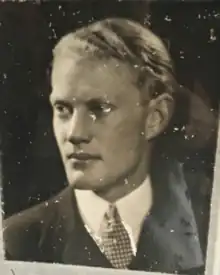Paul Latham
Major Sir Herbert Paul Latham, 2nd Baronet (22 April 1905 – 24 July 1955)[1] was a British Conservative Party politician who served as Member of Parliament (MP) for Scarborough and Whitby constituency from 1931 to 1941.
Major Sir Herbert Paul Latham 2nd Baronet | |
|---|---|
 Paul Latham in the 1930s | |
| Member of Parliament for Scarborough and Whitby | |
| In office 6 May 1931 – 18 August 1941 | |
| Preceded by | Sidney Herbert |
| Succeeded by | Alexander Spearman |
| Personal details | |
| Born | 22 April 1905 |
| Died | 24 July 1955 (aged 50) |
| Nationality | British |
| Political party | Conservative |
| Spouse | Lady Patricia Doreen Moore (1933–1943) |
| Alma mater | Magdalen College, Oxford |
Biography
The son of Sir Thomas Paul Latham and his wife Florence Clara née Walley, he was educated at Eton College and Magdalen College, Oxford.[2]
Between 1928 and 1934 Latham was a member of the London County Council, representing Lewisham East as a member of the Conservative-backed Municipal Reform Party.[2][3]
At the 1929 general election, he stood as the Conservative candidate in Rotherham,[2] a safe seat for the Labour Party where he was runner-up with 23% of the votes.[4]
In April 1931 the standing MP for Scarborough and Whitby, Sidney Herbert, resigned from the House of Commons. Latham was selected as the Conservative candidate for the resulting by-election on 6 May, which he won with a majority of 5% of the votes over his Liberal Party opponent.[4]
Arrest, attempted suicide and court-martial
During World War II, despite being exempt from military service, Latham volunteered to join the army. In 1941, however, he was arrested [5] for "improper behaviour", a homosexual act, with three gunners and a civilian[6] (letters he had written to those involved had been discovered) while serving as an officer in the Royal Artillery.[2]
Latham then tried to kill himself by riding a motorcycle into a tree.[7][8]
He was court-martialled and found guilty of ten charges of indecent conduct and of attempted suicide and was discharged dishonourably and imprisoned for two years without hard labour. Latham's court-martial was the first time a sitting MP who was also in the army had been court-martialled since Lieutenant-General Sir John Murray in 1815. He resigned his seat in Parliament.[9] After his release in 1943 Latham commented to his fellow MP Henry Channon that he had found conditions and treatment at Maidstone Gaol better than at Eton.[10]
Family
In 1933 Latham married Lady Patricia Doreen Moore, the daughter of Henry Moore, 10th Earl of Drogheda and Kathleen Pelham Burn.[2] She divorced him in 1943 and died in 1947. He was succeeded in the baronetcy by their only son, Richard Thomas Paul Latham, born in April 1934.[2]
In 1932 Latham purchased Herstmonceux Castle in Sussex and carried on its restoration.[2]
References
- "Baronetcies: L (part 1)". Leigh Rayment's Baronetage pages. Archived from the original on 1 May 2008. Retrieved 30 November 2009.
{{cite web}}: CS1 maint: unfit URL (link) - "Obituary: Sir Paul Latham". The Times. 26 July 1955. p. 11.
- Jackson, W Eric (1965). Achievement. A Short History of the LCC. London: Longmans. p. 270.
- Craig, F. W. S. (1983) [1969]. British parliamentary election results 1918–1949 (3rd ed.). Chichester: Parliamentary Research Services. pp. 229, 509. ISBN 0-900178-06-X.
- "Arrest of a member". House of Commons Debates 31 July 1941 vol 373 column 1540. Parliamentary Debates (Hansard). 31 July 1941. Retrieved 30 November 2009.
- Hyde, Harford Montgomery (1970). The Love that Dared Not Speak Its Name: A Candid History of Homosexuality in Britain. Little, Brown. p. 212.
- Sweet, Matthew (30 October 2011). "Ballroom blitz: sex and spying in London's wartime hotels". The Observer. Retrieved 21 April 2013.
- Davenport-Hines, Richard (15 November 1998). "No longer outraged". The Independent. Archived from the original on 25 May 2022. Retrieved 21 April 2013.
- "United Kingdom II: 1900 to the Present". glbtq.com. 2007. Archived from the original on 5 July 2008. Retrieved 2 September 2008.
- Henry "Chips" Channon: The Diaries (Volume 2), 22nd January 1943